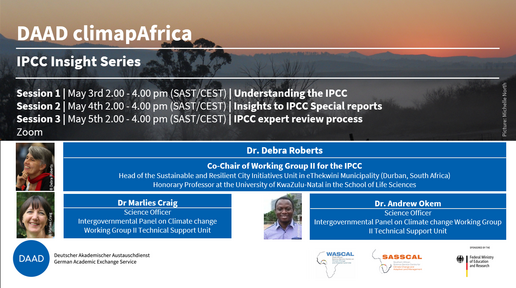![Dr. Gloria Okafor]()
Climate data provides a great deal of information needed to understand the complex interactions of the major climate system components (i.e., atmosphere, ocean, land, biosphere, and cryosphere) which give rise to the Earth's climate and climate change. The associated changes impact almost all aspects of human endeavor.
Besides, the economic growth and development of any nation are largely influenced by the past, present, and future state of the climate system because priority sectors, such as agriculture, energy, water resources, and others are sensitive to climate change and variability. Therefore, we need to analyze climate data derived from observations and models to generate robust scientific evidence to underpin climate change decisions in critical sectors like water resources and agriculture, etc. We also need to analyze the links between these and human and ecosystem development.
With increasing computing capabilities, large volumes of climate data are observed and generated from climate models, satellites, and other platforms. These datasets are associated with geographical locations at different spatiotemporal scales and transmitted in different formats. To mention a few GRIB, netCDF and HDF, etc. Climate data can be large in volume and may require some forms of quality control and postprocessing, which requires specialized skills and expertise. Hence, the need for this training to build capacity in the use of relevant climate data analysis and visualization tools.
Also, enhanced observation techniques such as satellite operations contribute to the growth of globally complete climate-related data. And outputs from climate models provide future projections of essential climate variables including temperature, and precipitation to improve efforts directed towards combating potential future challenges associated with climate change. Therefore, visualizing climate data can help us look past our own experience of the weather and focus on long-term patterns and trends that exist on a scale we otherwise would have trouble noticing.
Consequently, as a climate scientist, we need to collaborate with different sector managers and policymakers to create and interpret scientific knowledge in a way that is relevant to help them make informed decisions and policies. Thus, this capacity-development on ‘Climate data analysis and visualization’ was designed to equip scientists with the relevant skills to transform climate data into useful climate knowledge to guide policy and decision-making processes. The virtual seminar will be held in two sessions with different facilitators;
Session I | 28.09.21 | 01.00 - 03.00 pm (GMT)
Facilitators
![Dr. Adeyeri Oluwafemi]()
Dr. Oluwafemi Adeyeri
DAAD climapAfrica Postdoctoral fellow
Department of Meteorology and Climate Science, Federal University of Technology, Akure
Nigeria
![Dr. Ie Gbode]()
Dr. Imoleayo E. Gbode
DAAD climapAfrica Postdoctoral fellow
Department of Meteorology and Climate Science, Federal University of Technology, Akure
Nigeria
The first session was successfully held and moderated by Dr. Gloria C. Okafor.
A total of 37 early-career scientists attended the online seminar (See picture highlight below). Datasets and documentation on step-by-step software installations were provided before the seminar. Response to questions and requests for support were addressed before and during the session and via email. At the end of this session, participants were able to learn how to use Climate Data Operator (CDO) to perform some basic operations on netCDF files including querying data files, concatenate or append, differentiate netCDF files and combine multiple operators. The use of Panoply to make and export plots was also demonstrated. Participants were introduced to the open-source software and links were provided for further readings.
Overall, satisfactory responses were expressed by the participants who shared their feedbacks. Below are quotes of some responses received from the participants:
Really this training is what I was looking for. I have worked with more than 1500 netcdf files few weeks ago. I was compulsory to use python to combine and slice the data I needed. It took me more time I have expected in order to understand the netcdf file extension and how to handled it. I have tried to install CDO but I failed it installation. This training is very helpful’.
‘Organize the training regularly with different climatic variables’
Finally, we thank all participants in this session and look forward to meeting them again soon in the next session where we will cover the use of other tools, such as ncview, nco and ClimPACT, a tool for generating climate indices.
Session II | 13.10.21 | 12.00 – 02.00 pm (GMT)
Facilitators:
![Dr. Romaric Odoulami]()
Dr. Romaric Odoulami
DAAD climapAfrica Postdoctoral Research Fellow
University of Cape Town
African Climate and Development Initiative
South Africa
![Dr. Souleymane Sanogo]()
Dr. Souleymane Sanogo
DAAD climapAfrica Postdoctoral Fellow
University of Sciences, Techniques and Technologies of Bamako
Mali
Please, contact us at ccmclimap@wascal.org for further questions or clarifications.
Further information on the group members can be found on here.
Author: Dr. Gloria Okafor






